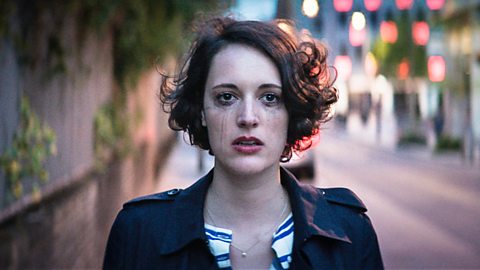I've been trying to work out why this doesn’t irritate me the way Lena Dunham’s Girls did, given the initial similarities. For all of Dunham's self-flagellation, there was nonetheless a sense of entitlement to her project – ultimately she does want to be the "voice of a generation" despite the claim being sheathed in irony within the show. Her erasure of people of colour is all the more damning as a result. Fleabag is also white and middle class (and to my eyes the design of her flat doesn't quite square with the economics of running a failing small business in London), but she has no pretensions to being destined for great things. She's just another lost soul in the city.
The stakes are also higher than anything Hannah Horvath has to deal with. Both characters have a lack of self-esteem which lead them to make poor romantic choices (to put it mildly). But with Fleabag, this is presented as a kind of yawning crater opened up as a result of multiple bereavements, made worse by the fact she blames herself for one of them. The show is funny in the typical excruciating British comedy-of-manners way, but it's just as much a dark drama about someone's life falling apart, and their attempt to clutch desperately at things that might put it back together.
That's the first season anyway. The second one is about the upswing after reaching the pits of despair. The cleverest part of the show is that it finds a way to provide a psychological explanation for its signature technical innovation – Phoebe Waller-Bridge's masterful asides to camera. I imagine this technique grew out of the show's origins as a one-woman play, but there was always something slightly incongruous about a deeply lonely person having this animated inner dialogue with the audience. Who really is she talking to?
The introduction of a love interest who is a priest brings this out. The dramatic tension inherent in a sexually voracious character falling in love with someone sworn to abstinence is obvious. But the connection the two characters form is built on this propensity to communicate with invisible people. The show draws this out explicitly – the priest is the only one who can sense Fleabag's asides, even if he can't overhear them. They are prayers, and we are Fleabag's chorus of gods.
The arc of the show thus becomes Fleabag's conjuration of an army of silent companions that bear witness to her struggles – an imaginary source of comfort and validation she cannot get from her deeply messed up family. The show ends with the realisation that she doesn't need us anymore – unlike the priest, who chooses God over love and in doing so is revealed to be a coward. The show might break off the affair at the end, and be seen to end on a downer. But there is a triumph in Fleabag's final wave goodbye to us. She is casting off her crutches and is finally able to cope on her own.


No comments:
Post a Comment